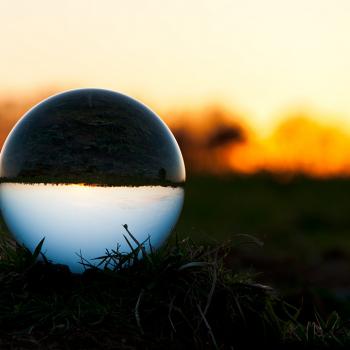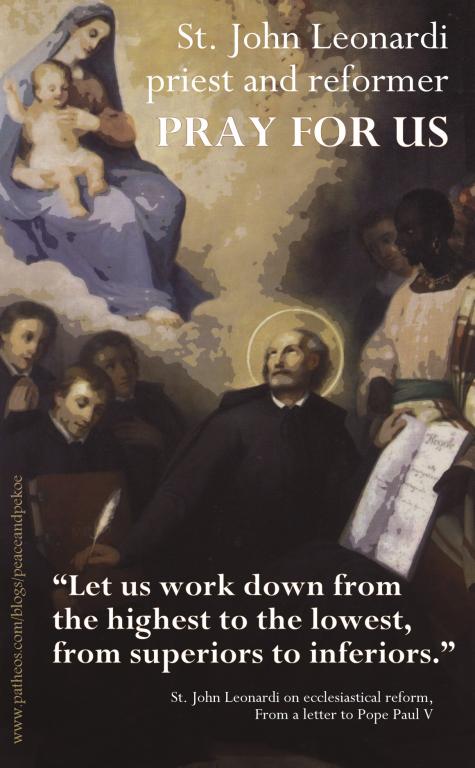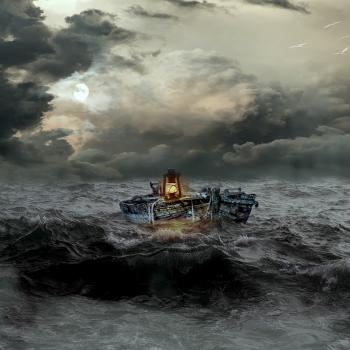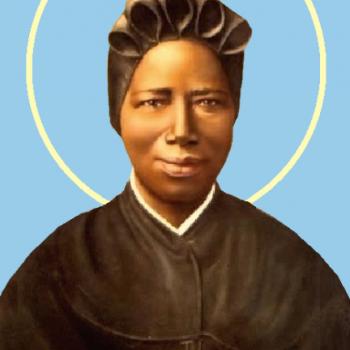We talk about living in a post-Christian era, but what does that actually look like?
Does it look like the serene and peaceful world of John Lennon’s Imagine?
Or does it look like the tumultuous and fractious rise of Donald Trump?
![By Mykola Swarnyk (Own work) [CC BY-SA 3.0 (http://creativecommons.org/licenses/by-sa/3.0)], via Wikimedia Commons](https://wp-media.patheos.com/blogs/sites/754/2017/03/Buteo_jamaicensis_Corvus_brachyrhynchos_Toronto2-e1490107354799.jpg)
A columnist from The Atlantic posits that the rise in populist rhetoric and increasing divisiveness in political discourse is due, not to division between a religious right and a secular left, but to increased secularization on all sides of the spectrum. Peter Beinart notes that although commenters on the left have tended to predict that the rise in “nones”–people of no particular religious affiliation–would ease conflict over hot button issues like abortion and gay marriage, the reality is that divisions in public life have instead shifted ground and become increasingly heated. “As Americans have left organized religion, they haven’t stopped viewing politics as a struggle between ‘us’ and ‘them,'” Beinart writes. “Many have come to define us and them in even more primal and irreconcilable ways.”
What common ground there once was for dialogue between right and left appears to be eroding, and the culture wars–a term once used to refer to the need to attract opponents through the strength of your ideals and positive vision–has been redefined along racial and ethnic lines as a battle between an increasingly de-Christianized version of “Western Culture” vs. everybody else.
So what does this shift look like?
“Research shows that evangelicals who don’t regularly attend church are less hostile to gay people than those who do. But they’re more hostile to African Americans, Latinos, and Muslims. In 2008, the University of Iowa’s Benjamin Knoll noted that among Catholics, mainline Protestants, and born-again Protestants, the less you attended church, the more anti-immigration you were. (This may be true in Europe as well. A recent thesis at Sweden’s Uppsala University, by an undergraduate named Ludvig Broomé, compared supporters of the far-right Swedish Democrats with people who voted for mainstream candidates. The former were less likely to attend church, or belong to any other community organization.)”
Beinart speculates on various mechanisms for this shift. He speculates that disconnection from the structure and stability of communities of faith may leave people more frightful and less optimistic about their place in the world. We know that populism feeds off fear; he speculates that religious faith eases this fear, especially for men, who more easily become isolated without the ties of church and family. He speculates that, despite how segregated American churches tend to be, they may still provide more experience of integration than the average American experiences elsewhere, and thus promote tolerance and dialogue.
It’s not until the end of the article that he cites a theory that strikes me as obvious, from my experience of attempting to live a life of faith, and my observations of the role religious observance plays in the lives of others. Beinart writes:
“In their book, Religion and Politics in the United States, Kenneth D. Wald and Allison Calhoun-Brown reference a different theory: that the most-committed members of a church are more likely than those who are casually involved to let its message of universal love erode their prejudices.”
The Christian ideal has been more often criticized for being unachievable and unrealistic than anything else. Love your enemies? Do good to those who hate you? Forgive, that you may be forgiven. These have all been more honoured in word than in deed, and it can be messy and confusing and hard to let them humble and guide us in the midst of conflicting messages and desires.
Following in Christ’s footsteps is difficult, and all fall short. We are too often hypocrites and sinners.
But perhaps we were all better off when we knew ourselves to be sinners, and yet strove. Perhaps we are better off when the falcon can hear the falconer.
The Second Coming by WB Yeats
Turning and turning in the widening gyre
The falcon cannot hear the falconer;
Things fall apart; the centre cannot hold;
Mere anarchy is loosed upon the world,
The blood-dimmed tide is loosed, and everywhere
The ceremony of innocence is drowned;
The best lack all conviction, while the worst
Are full of passionate intensity.Surely some revelation is at hand;
Surely the Second Coming is at hand.
The Second Coming! Hardly are those words out
When a vast image out of Spiritus Mundi
Troubles my sight: somewhere in sands of the desert
A shape with lion body and the head of a man,
A gaze blank and pitiless as the sun,
Is moving its slow thighs, while all about it
Reel shadows of the indignant desert birds.
The darkness drops again; but now I know
That twenty centuries of stony sleep
Were vexed to nightmare by a rocking cradle,
And what rough beast, its hour come round at last,
Slouches towards Bethlehem to be born?
H/T to Get Religion for drawing my attention to this fascinating article.











